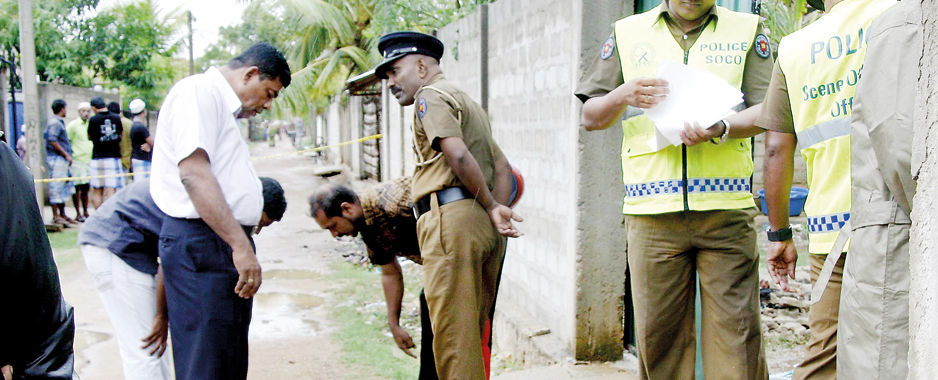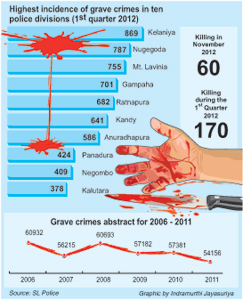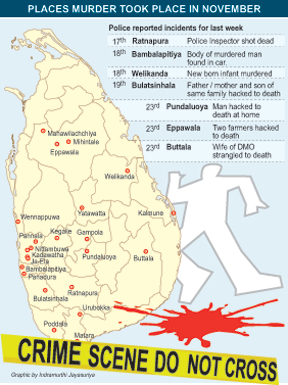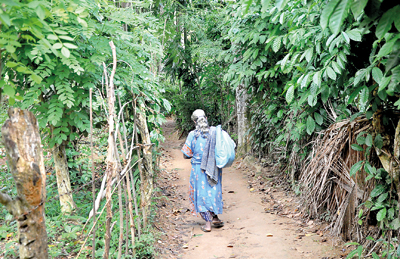News
Homicides galore: What’s going wrong?
On Wednesday the body of a 47-year-old-woman was found lying in the bathroom of her house in Moragahahena, Horana. Her head had been smashed several times by a pestle and the gold necklace she wore was also missing.

A recent crime scene in Puttalam. Pic by Hiran Priyankara Jayasinghe
It was Swarna Matarage’s husband, who first found out about the murder when he reached home around 7:45 pm. Following procedure, Horana Magistrate Mahinda Ranasinghe ordered the police to apprehend the suspect and a special police team on the instructions of Senior Superintendent H.M. Dharmasena has been formed to investigate the case.
This was not the only murder that took place last week. The body of a 44-year-old mother of two was recovered from Muturaja Watte in Wattala on Tuesday.According to police, the woman had been stabbed by her husband over a personal dispute.
Police and news reports reveal that there were more of such incidents that took place last week. The cases, said a senior official, were more brutal and violent than the ones that usually took place. Most of these killings arise out of land disputes, personal enmities, misunderstandings, robberies or similar factors, he added.
With the post-conflict decline in crime suddenly witnessing a sharp upward trend, criminal lawyers and academics suggest there may be a lot of other factors contributing to the disturbing trend. The most common ones, they suggest are the “disillusionment with the era of peace” and the lack of government initiative to bring a “more positive change after the conflict”.
Fading hopes
The end of conflict, Colombo University sociologist S.T. Hettige said, brought much optimism for everyone. People were hoping for better living standards and improvement in socio-economic conditions but that had not happened, he said.

According to Prof. Hettige, rising corruption, failure of public institutions and growing deprivation are the main factors, which have bred hopelessness in people.
Years of conflict had created conditions conducive to violence, when the common man saw peace not bringing a positive change, he vented his frustration by resorting to violence, he added. This hopelessness was reflected in a recent survey which showed that around one third of the population wanted to leave the country, the sociologist said adding that only four to five per cent of the youth were going to universities. “This goes to show that the situation is not right”.
On the other hand, Prof. Jayan Mendis, Director and Consultant Psychiatrist at the National Institute of Mental Health (NIMH), said the post-conflict era had granted the people the time to move over to personal issues. “As their lives return to normalcy, they don’t have the suicide attacks or bomb blasts to worry about. So now they are delving into personal issues such as land disputes and other enmities,” he said.
There were some people who were living off the conflict, Prof. Mendis said.
It was a profitable venture for them. “It will take some time to eradicate these elements. In the meantime, they will continue to instigate violence and promote criminal activities to feed themselves,” he added. In a country where, during the armed conflict, psychiatric illnesses were 30 per cent higher than the figures for a region which has peace, psychological needs of the people need to be addressed, according to Prof Mendis. Otherwise, he said that surge in incidents of violence could continue.
No justice for all
Shifting the focus on the judicial system and the law enforcement, seasoned human rights and criminal lawyer Neil Dias had a different take on the matter. While society has been brutalised after years of conflict, he pointed towards the mediation board to point out a factor that gives the perpetrators the heart to commit heinous crimes.
“The criminals think that they can get out of it through some sort of out-of-court settlement or other mediation; so there is nothing stopping them,” he said. To prevent overcrowding of courts, offences under the section 315 and 316 of the Penal Code are usually settled out of court, according to the lawyer.
“You are providing relief to the judges, but what about the victims,” he asked. This will lead to increase in crimes, he added.
Building on Dias’ statement, a senior police officer, on the condition of anonymity, said reports in the media of a decrease in crime should also be analysed under the same light. “Sometimes cases are not registered and sometimes killings are projected to be as personal disputes to show a decline in crime and improvement of performance, but in essence it is a distortion of facts,” he said.
Former Deputy Inspector General Nimal Mediwake was also critical of the performance of the law enforcement agencies. “There is a need to improve the entire setup. From arresting to charging and prosecuting, police and the judicial setup have to deliver,” he said.
Finding a way out
Mr. Mediwake called for preventive action and awareness campaigns among the general public to improve the situation. “Since there can’t be police officers or military personnel in every household, people should be made aware of the consequences of their wrongdoings,” he said.
Moreover, since most of the killings are being reported from the rural areas, Mr. Mediwake called for the setting up of civil defence committees. This way the village folk would be able to provide quick justice and be able to address grievances swiftly.
Further, if they found something wrong they could preempt it by calling for help before any untoward incident took place, he added.
Follow @timesonlinelk
comments powered by Disqus



























